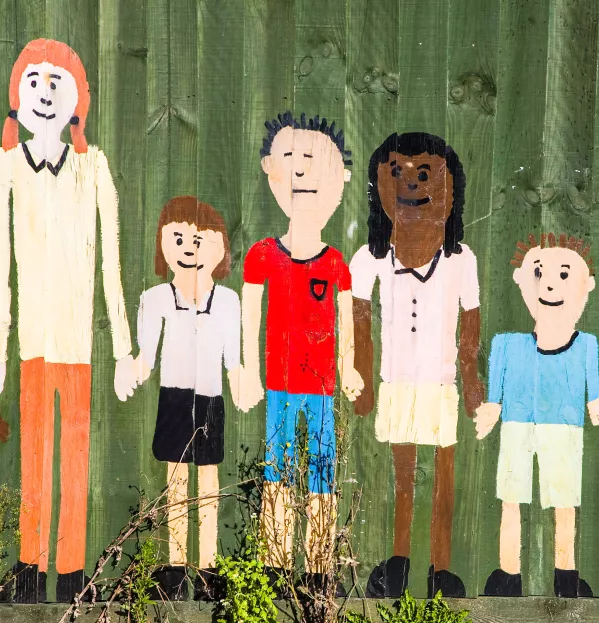- Home
- Teaching & Learning
- Early Years
- How our ‘family zone’ is making more children school-ready
How our ‘family zone’ is making more children school-ready

In recent years, the number of children we would consider as “school-ready” has been decreasing. This is an issue across the country. A recent survey for early years charity Kindred Squared showed that more than one-third of children (35 per cent) were not ready to start Reception in 2023.
We’ve noticed a similar pattern at our school. There has been a decline in the number of children starting Reception with independent skills, such as dressing themselves, toileting and mark making.
And we’ve seen more children needing support with speech and language and, overall, the number of children reaching the Reception baseline has been fewer each September.
As a result, our Reception teachers have needed to adapt and change their approach, which puts pressure on them and makes it more difficult for them to cover the usual early years curriculum. It also means classes need more adult support to address additional gaps and, naturally, this puts pressure on school finances.
School readiness: how a ‘family zone’ can help
We knew that we had to do something to address this, and the solution we came up with was to set up a “family zone” to provide opportunities to better support children before they start their school journey.
Established in 2021, the provision is a safe space for preschool children to play, listen to stories and take part in arts and crafts activities with their families. It’s used by local parents with preschool-aged children, some of whom already have siblings in our school.
While families are spending time in the zone, we have conversations with parents about toilet training and other aspects of their child’s development.
We also run activities that will encourage skills that are beneficial for children when they start school, such as fine and gross motor skills, which will support them in their mark making and early writing.
The zone provides a chance for early home-school partnerships to develop and allows parents to connect not just with us, but with each other.
- How language got sidelined in schools and why it matters
- Reception baseline: wrong time, wrong data, wrong idea?
- How to put our broken support system back together
We frequently invite external support agencies to our sessions as well, which helps to build additional community links. For example, our trust, Heart Academies Trust, funds a speech and language therapist for the three primary schools in the trust.
As well as working with our children and providing CPD for staff, the speech and language therapist has worked with families in our family zone to address language development in the children who will potentially be part of our school.
We also signpost families to the relevant outside agencies, such as local children centres, speech and language drop-in sessions and parenting sessions. Where a child has an identified need, we are able to make parents aware of the pathways available to help.
So, how did we make all of this a reality? We were fortunate that we already had a space that was suitable to convert without a huge amount of work.
Our trust and local housing association (BPHA) provided the funding for the initial setup, most of which went on general resources, white goods and making the environment a welcoming and comfortable space for families.
The zone is open each morning and was initially staffed by one of our experienced learning support assistants. However, we now encourage our families to take a more active role, and the zone is primarily run by the community, for the community. Our family support worker and early years lead oversee this and offer bespoke support as necessary.
Building on the groundwork
The family zone lays the groundwork, but then we need to build on that.
We place a lot of importance on the transition process. We liaise with all of our feeder nurseries as early as a whole year before the children start with us, so that we are aware of any specific adaptations we may need to make in good time - including any additional staff we may need to recruit and train.
Regardless of whether they have previously attended the family zone, we invite parents and children into dedicated “meet and greet” sessions prior to children starting with us, where we share our expectations and advise them about how to prepare and support their children over the two to three months before they start school.
We have found this to be effective, as parents are not always completely aware of school readiness expectations.
As every teacher knows, no two classes or year groups are ever the same. Knowing our children well, even before they officially join us, has given us huge advantages in how well we are prepared to work with them.
Establishing the family zone means that we also know our children’s families well - and we have found that taking the time to build honest and robust relationships with them is invaluable. They trust us, as they know we offer support, never judge and treat every child as an individual.
By providing bespoke support not just for the children but for their parents, too, we are finding it easier to adapt our practice to ensure that all children develop and thrive, regardless of need and their starting points.
Dr Andie BenBrahim is headteacher of Shackleton Primary in Bedford
For the latest research, pedagogy and practical classroom advice delivered directly to your inbox every week, sign up to our Teaching Essentials newsletter
Keep reading for just £1 per month
You've reached your limit of free articles this month. Subscribe for £1 per month for three months and get:
- Unlimited access to all Tes magazine content
- Exclusive subscriber-only stories
- Award-winning email newsletters



